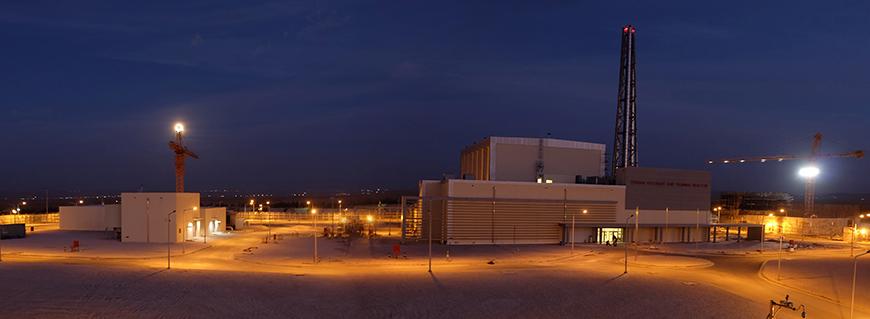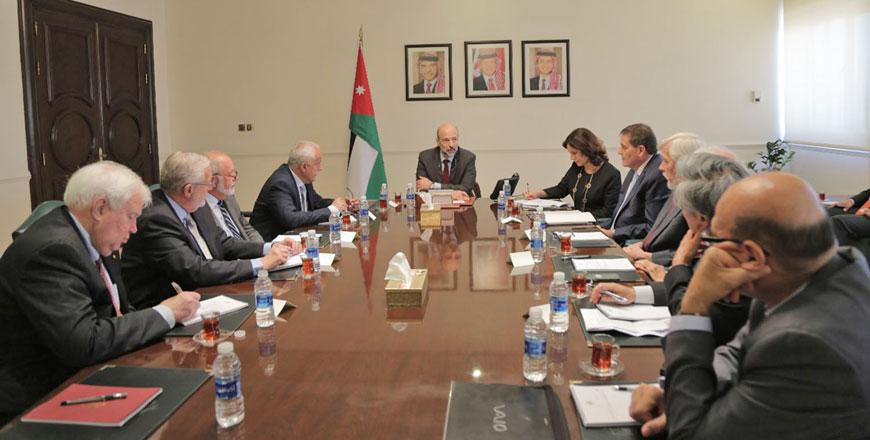You are here
Nuclear energy vital in Jordan energy strategy — IAG report
By JT - Dec 29,2019 - Last updated at Dec 29,2019

International Advisory Group members pose for a group photo during its fourth meeting (Photo courtesy of IAG)
AMMAN — Jordan must retain nuclear energy in its energy strategy for the mid- and long-term, the International Advisory Group (IAG) “strongly” recommended in a summary report of its fourth meeting.
Nuclear energy is low-carbon and an important component of energy security and long-term price stability for any nation. For nuclear energy, long-term fuel supplies can be maintained onsite, thereby providing energy independence, the report, a copy of which was made available to The Jordan Times, said.
The contribution of nuclear energy needs to be discussed and coordinated with Ministry of Energy and Mineral Resources, the report said, adding that the ministry could benefit from the use of the IAEA’s energy planning/evaluation tools that include the nuclear option.
“We anticipate that the need for global carbon emission reductions, which is already very strong, will become even more compelling with each passing year. Climate change is already with us. Extreme weather events are increasing in frequency, as Jordan has already experienced,” read the report.
Looking at alternative energy sources, the report said that the use of oil shale and eventually natural gas may become increasingly challenging for Jordan’s industries in the future.
The report cited studies at Massachusetts Institute of Technology (MIT) showing that reliance only on renewable energy and batteries will be prohibitively expensive, even if future battery costs are significantly reduced.
Additional MIT studies have compared electricity prices in the EU as a function of each country’s use of renewables. The larger the fraction of intermittent renewables in a country, the higher their electricity cost, the report said.
In addition, data show that countries with a large fraction of renewable power do not necessarily have low greenhouse gas emissions, according to the report.
The report also stressed that the independence of the Jordan Atomic Energy Commission (JAEC) has been “eroded” since its budget was merged into the national general government budget and the civil service bureau, resulting in “significant damage” to the organisation.
The JAEC was set up as an independent entity in 2008 because of its specialised and sensitive missions and the need to attract and retain high-level nuclear professionals and specialists.
“It must be noted that high-level nuclear professionals and specialists command salaries and benefits in industry that substantially exceed those available to civil servants,” said the report.
As the JAEC is now bound by civil service salaries, it is experiencing difficulty in retention and hiring of key personnel, and suffering delays in its ability to obtain key components needed to assure safe operations. The loss of key personnel to industry and delayed equipment purchases at the Jordan Research and Training Reactor (JRTR) are "unfortunate" examples of this problem, the report continued.
Maintaining the JAEC as an independent entity is a "strong recommendation" of the IAG, according to the report.
The IAG in its report also said that it is “greatly alarmed” by the proposed merging of the JAEC with the Energy and Minerals Regulatory Commission (EMRC), as the JAEC is the developer and promoter of nuclear activities, whereas the EMRC is the nuclear regulator.
Citing its “extensive experience” with organisational arrangements involving a developer/promoter and a regulator, the IAG cautioned that this proposed merger “could undermine good governance and is absolutely counter to the International Atomic Energy Agency (IAEA) Fundamental Safety Principles”.
Those principles state that the nuclear regulator should be established as an "independent" entity within the government so as to assure that the regulator is not affected by pressures that might compromise a focus on nuclear safety, the report added.
The IAG added that despite its concerns, it is “significantly impressed” by the major accomplishments achieved by the JAEC since its last meeting.
The JAEC’s current projects — including the JRTR, the intergovernmental SESAME facility and the Jordan Uranium Mining Company — provide a “foundation for Jordan’s continuing leadership” in nuclear science and technology in the region, the report concluded.
In 2015, the government approved the formation of the IAG, which is tasked with reviewing Jordan’s progress in implementing its nuclear programme.
Related Articles
AMMAN — The International Advisory Group (IAG) on Monday recommended that Jordan choose alternative energy sources that are more sustainable
AMMAN — The Jordan Atomic Energy Commission (JAEC) has just completed the hot commissioning tests of the Jordan Research and Training Reacto
AMMAN — Prime Minister Omar Razzaz on Thursday met with the members of the International Advisory Group (IAG), tasked with reviewing Jordan’













